
"A Samurai's nature retreat near gushing waterfalls"
Hoshino Resorts will open KAI Akiu in Akiu Onsen, Miyagi Prefecture, on April 25th, 2024, under its hot spring ryokan brand KAI. The concept is "A Samurai's nature retreat near gushing waterfalls." Located in a spot overlooking the Natori River flowing from the Ou Mountains, guests can enjoy the mountain streams and the change in seasonal landscape at this ryokan. KAI Akiu will be the 23rd facility under the KAI brand, the second facility in the Tohoku area following KAI Tsugaru in Owani Onsen, Aomori Prefecture, and the first in Miyagi Prefecture.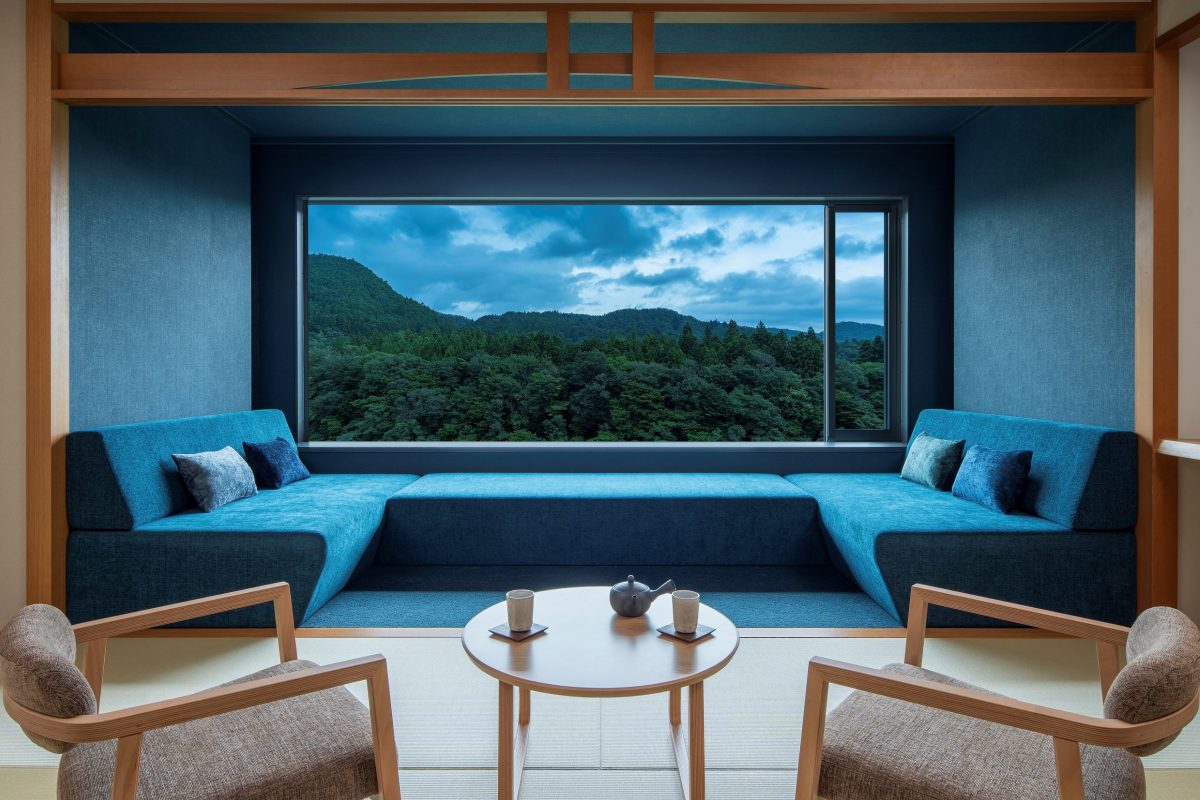
About KAI Akiu
Akiu Onsen in Miyagi Prefecture is a hot spring town with a long history that dates back to the Kofun period around 1,500 years ago, and it is said to have been a hot spring that successive emperors and feudal lords such as Date Masamune had visited to recuperate.*1 Nestled in a quiet area deep within Akiu Onsen, KAI Akiu is an onsen ryokan located right next to the Natori River and surrounded by lush nature. Guests can enjoy the beauty of each season with the magnificent greenery in spring and summer, the autumn foliage in fall, and the snowy landscape in winter.
The feudal lord Masamune Date was at the origin of the prosperity of the Tohoku region, with Sendai at its center. He brought a sophisticated and innovative culture, called the “Date culture,” with an open mind toward overseas countries. KAI Akiu offers a stay that incorporates local products and traditional crafts, and hospitality inspired by Date culture. Guests can experience a special time at a "Samurai's nature retreat near gushing waterfalls" to enjoy the stylish culture that bloomed under Masamune Date's rule.
*1: From the website of the Akiu Onsen Ryokan Union
Guest rooms: Deep blue rooms that frame the mountain stream view
KAI offers region-inspired rooms named KAI Signature Rooms, where guests can experience local culture and crafts. At KAI Akiu, the design of the room is inspired by the Rairaikyo Gorge along the Natori River, a scenic spot in Akiu Onsen that was once described as a “deep blue abyss.”*2 Guests can enjoy the seasonal scenery of the mountain streams framed by the room. Desks in the rooms are adorned with Sendai glass art that shimmers beautifully with shades of green in the light. Guests will be greeted with a room number sign made from Shiroishi washi paper (a traditional craft handed down from the Edo period), kokeshi doll patterns hidden in the sliding doors of bedrooms, and many other interior features that incorporate the use of local elements from Miyagi Prefecture.
*2: From the website of the Taihaku Community Development Promotion Council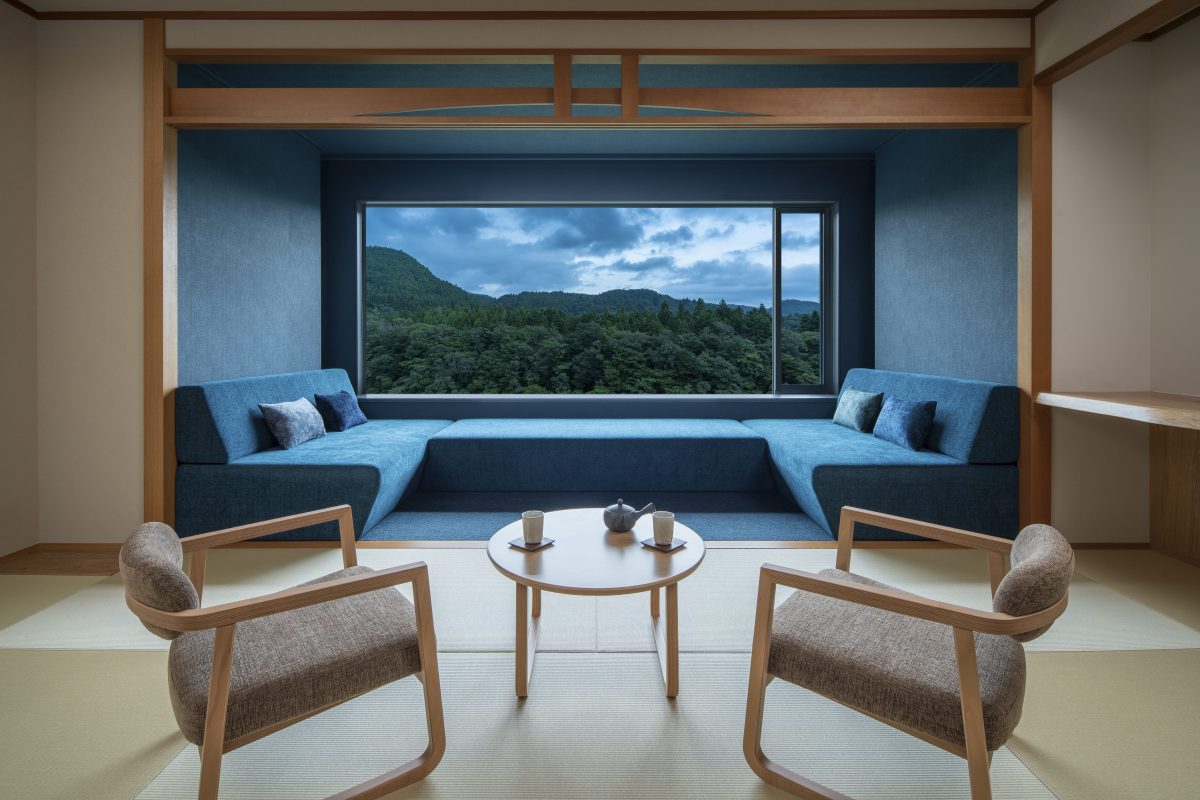
 <About Sendai Glass Art>
<About Sendai Glass Art>
The guest room's glass art was created by Koji Murayama from Kaiba Glass Workshop, located in Akiu. Sendai glass was once produced in the castle town of Sendai during the Edo period, but the technique was lost since then. Through comprehensive research, Craftsmen Murayama reproduced Sendai glass and has since been involved in research on glass materials and the planning, designing, and creation of objects. The glass he uses is made using the sand from a river that flows through Sendai City. It has a beautiful green color as if a reflection of the rich nature of Sendai, which was once called the Capital of Trees. When light shines through the glass artwork, it evokes the stream of the river and the sparkle of the water's surface.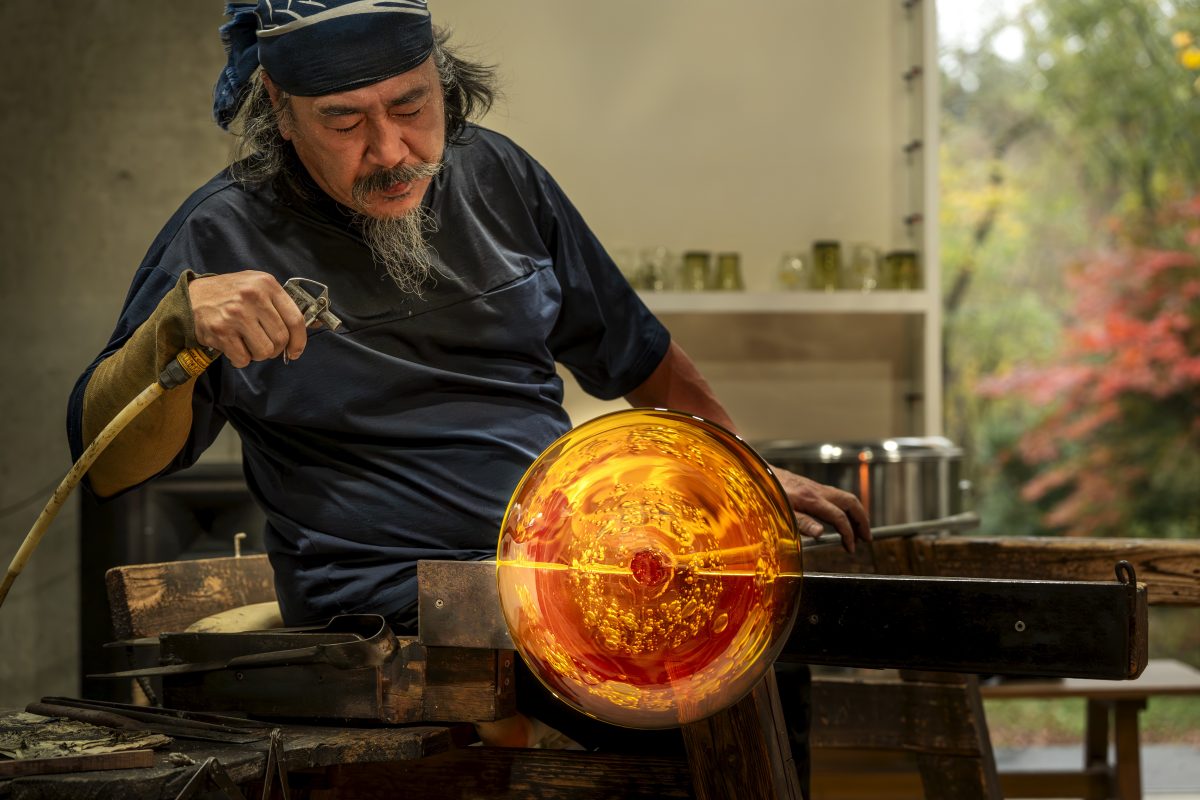
Food & Beverages: Kaiseki cuisine inspired by the meals of daimyo (regional lords)
The meal begins with a distinctive appetizer: a beef tail and Sendai miso rillette served with local Sendai fu, all presented on legged trays and with an appetizer dish echoing Lord Date's iconic polka-dot surcoat. The highlight of the Kaiseki dinner, however, is the "Fukahire Rikyu Nabe," a flavorful shark fin hot pot featuring Kesennuma's prized ingredient. It's thoughtfully paired with smooth sesame tofu for textural harmony and simmered in a delicious shellfish dashi, a natural complement given the rich seafood from the Miyagi coast where diverse currents meet. 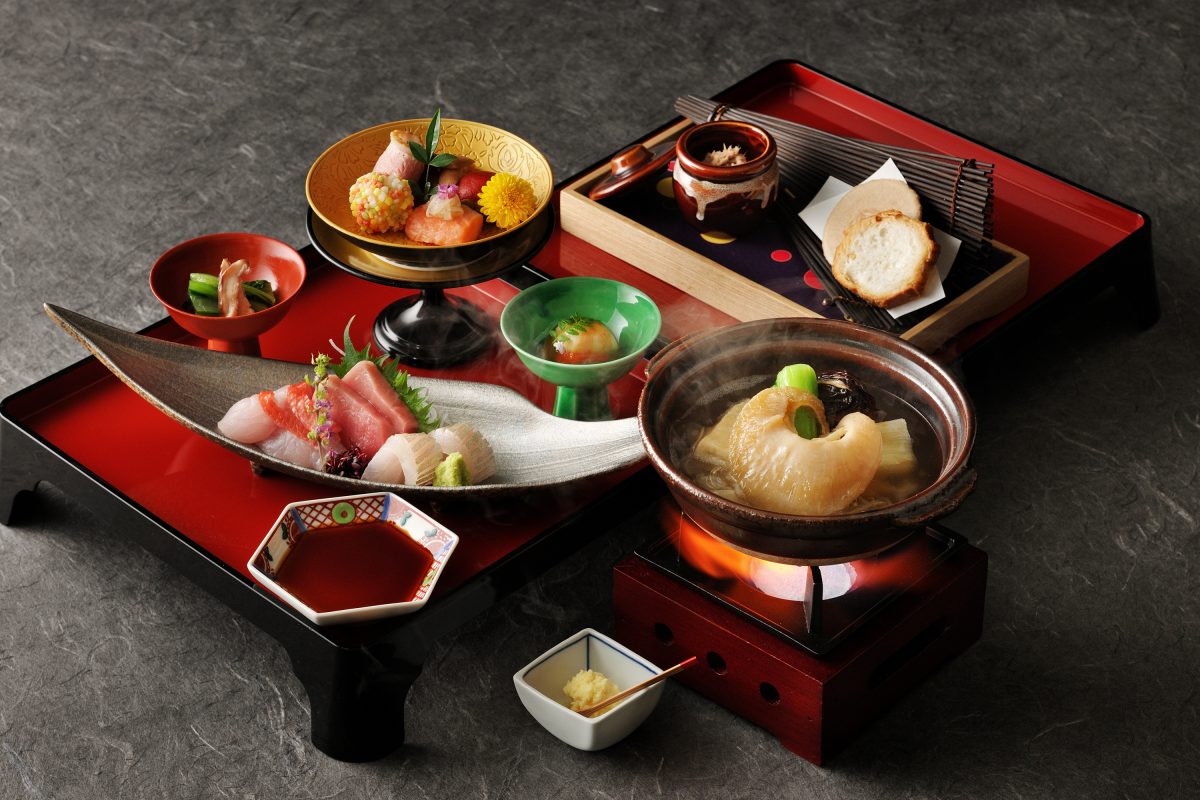
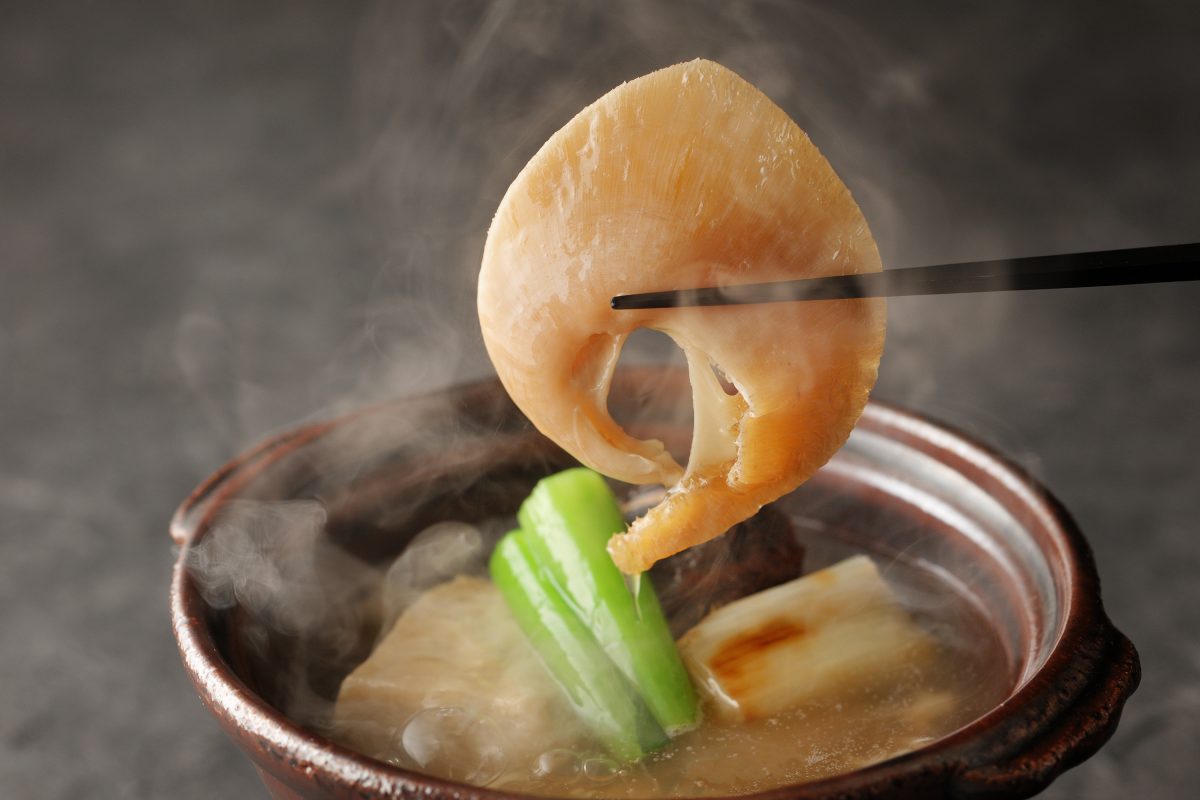
KAI Cultural Discovery:
Many traditional crafts, performing arts, and food cultures are unique to the different regions of Japan. As part of hospitality, each KAI property offers the KAI Cultural Discover program, which guests can enjoy during their stay. Through these cultural experiences, we hope to create a stay experience to discover or rediscover the local charms. Inspired by Masamune Date and his appreciation of Sake, guests can listen to the area's history while sipping on Miyagi's local sake.  This program is hosted in a special room characterized by the dark indigo color of the walls, which was considered auspicious among samurai with its name kachiiro, directly translates into "color of victory." The golden sun is also designed on the walls, inspired by the battle flag of Masamune Date. Guests can wear a haori drape during the activity, similar to what battlemen wore underneath their armor.
This program is hosted in a special room characterized by the dark indigo color of the walls, which was considered auspicious among samurai with its name kachiiro, directly translates into "color of victory." The golden sun is also designed on the walls, inspired by the battle flag of Masamune Date. Guests can wear a haori drape during the activity, similar to what battlemen wore underneath their armor.
It is said that Masamune Date was so fond of drinking that he invited craftsmen to build a mansion in a corner of the castle to make sake. Miyagi is famous for its rice, and there are many sake breweries still to this day. Some are historical sake breweries, which started when the Sendai Domain gave permission to create sake. Participants can enjoy local sake related to the Sendai Domain and make a toast following the method of that era. Guests can experience the spirit of valuing relationships with others and spend a rich time valuing new encounters with other participants.
Special Facilities
Hot springs: Open-air public baths surrounded by nature
Akiu Onsen has a long history and is said to have existed since the late Kofun period, more than 1400 years ago. It is known as one of the "three hot springs in Japan," and it was approved by the Emperor of the time as he was recovering from his illness. It was also loved by the common people in the era of Masamune Date and is still loved by many people.
At KAI Akiu, guests can enjoy open-air rock baths surrounded by trees and enjoy the sounds of the mountain streams. There are also two indoor public baths: a hot bath, and a lukewarm bath for relieving both mental and physical fatigue. These hot springs are classified as sodium-chloride and calcium-chloride springs, which can keep the body warm. They are also unique for the antibacterial properties of metaboric acid and the beautifying effects of calcium that can promote smoother skin.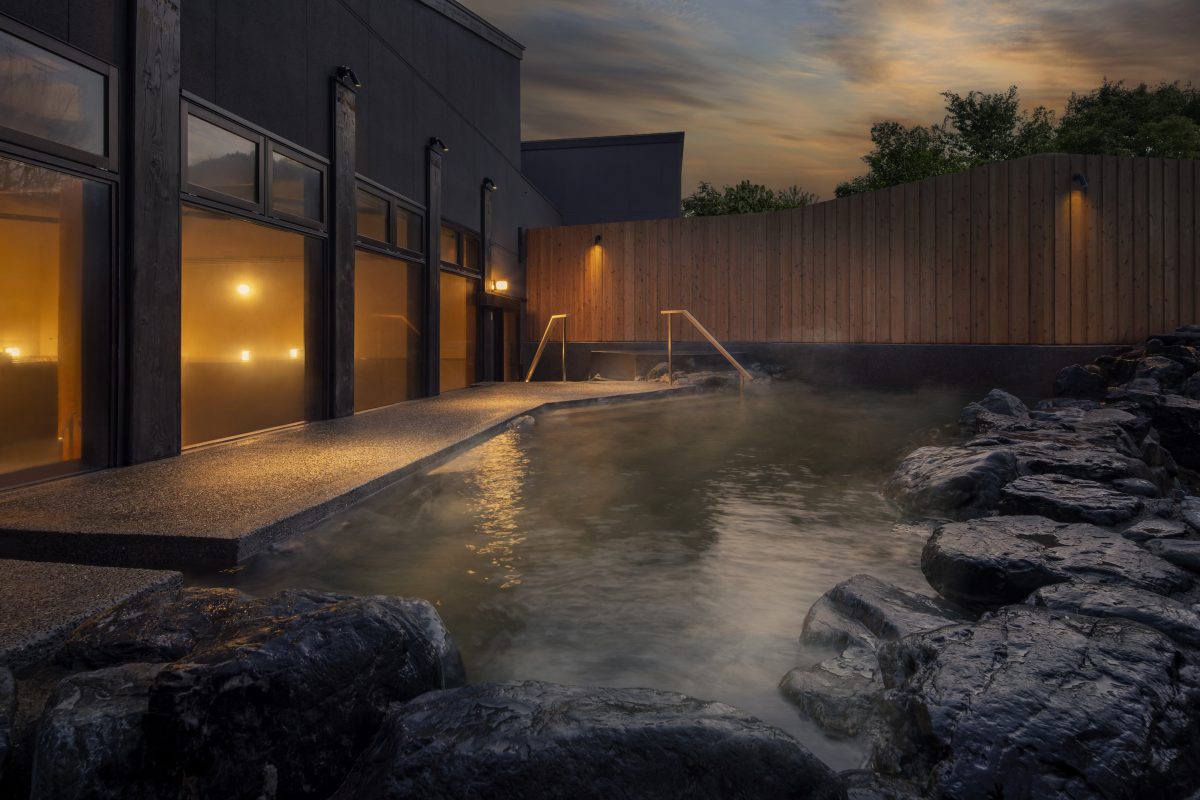
Public space: "Seseraki Lounge" inspired by mountain streams and Date Culture
The Seseraki Lounge is located in the space facing the mountain stream. It has a terrace with a foot bath, and guests can enjoy the scenery of the four seasons while facing the Natori River. “Seseraki” is an old word for the sound of water flowing in shallow water. The word “sese” means “shallow water,” and it can also mean “every moment/any given time.” In ancient times, Masamune Date composed a waka poem in which he wished people to feel the sounds of mountain streams, the natural air, and every moment of the season.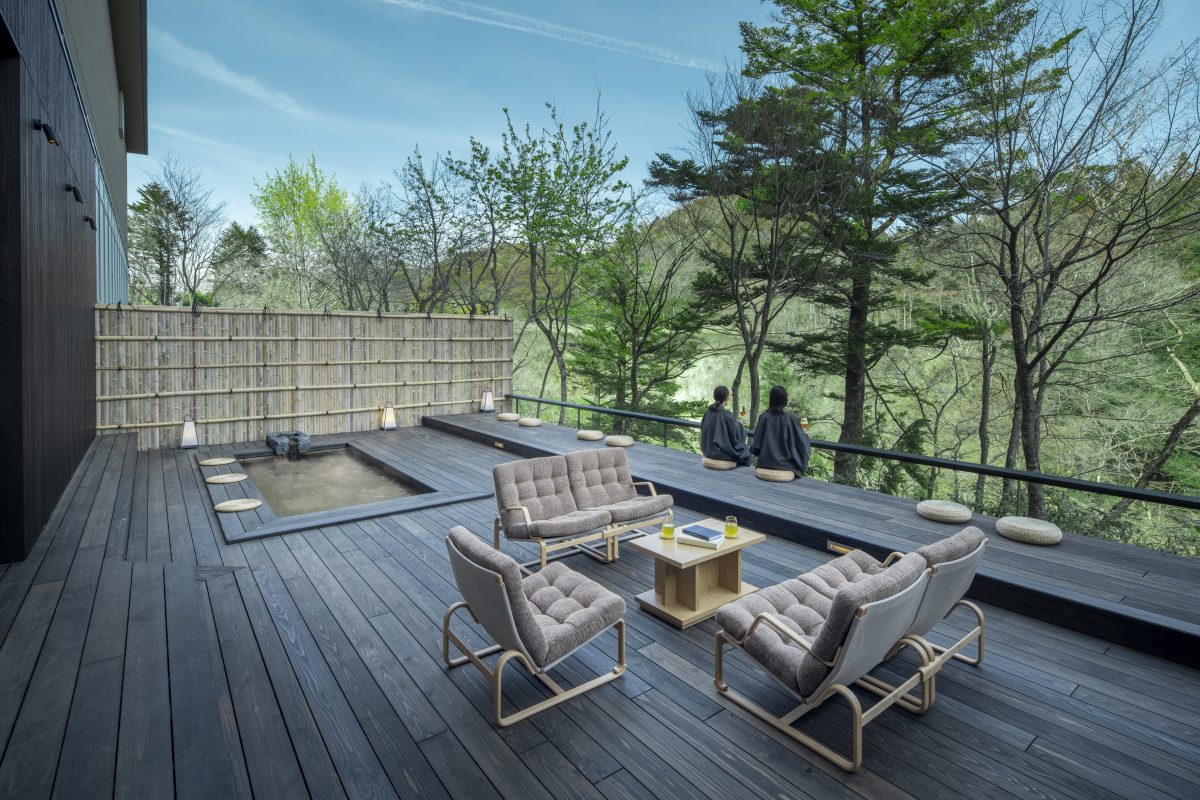
Masamune Date loved plants and flowers, bringing back flowers from overseas and growing them. It is also said that he enjoyed eating and drinking, watching Noh (traditional Japanese masked performance), and sometimes playing a small drum himself as a treat for his guests. Taking its inspiration from there, the Seseraki Lounge is decorated with flower arrangements of peonies and wisteria in the spring and white bush clover in the summer, as well as items associated with Masamune Date. Live instrumental performances will be held every night. The lounge offers a moment to relax and immerse oneself in nature while enjoying a glass of wine from a local winery, a seasonal drink, or traditional local sweets called “Sendai dagashi.”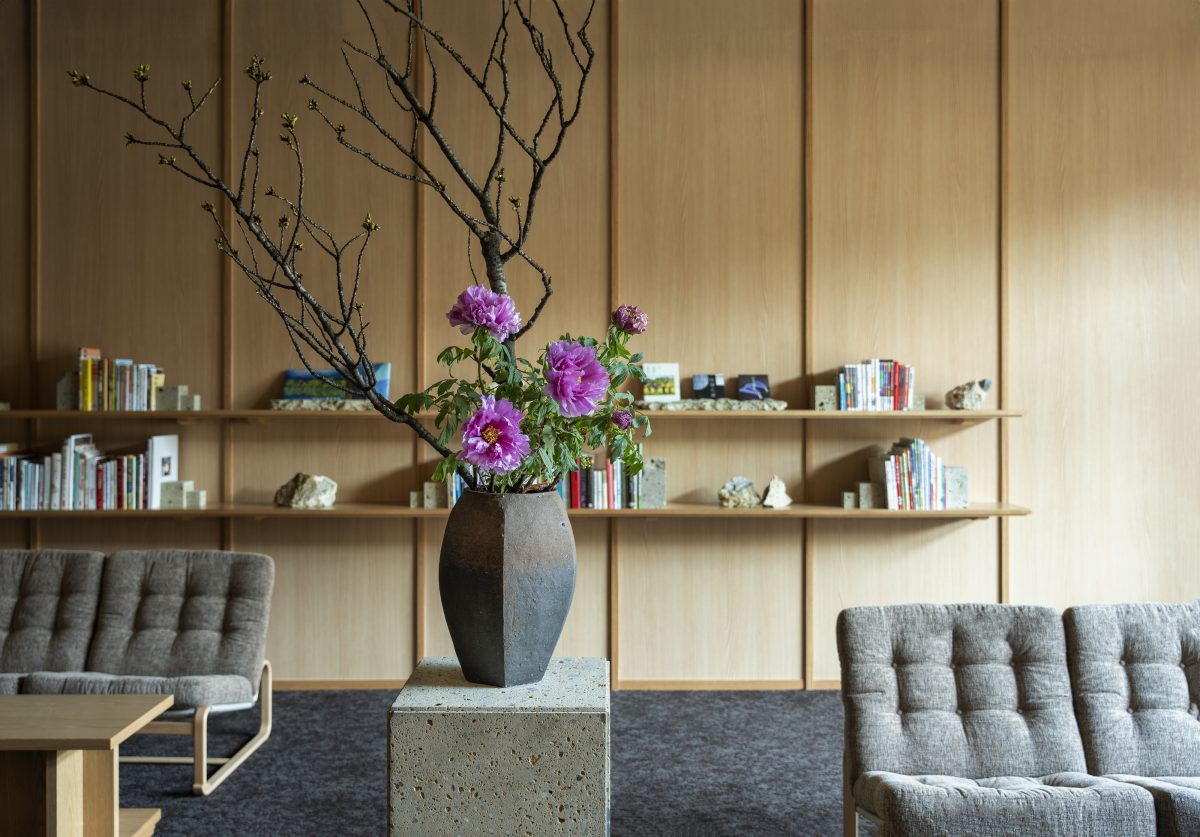
About KAI Akiu
Address: 1 Hirakura, Yumoto, Akiu-machi, Taihaku-ku, Sendai, Miyagi
Number of rooms: 49
Breakdown of rooms: 9 Japanese-style rooms (accommodate up to two guests), 30 Japanese-style rooms (accommodate up to three guests), 8 Japanese-style rooms (accommodate up to four guests), 1 special room, and 1 pet-friendly room
Facilities: Lobby, travel library, terrace, shop, dining area, public baths (separated by gender, 1 open-air bath and 2 indoor baths for each gender), Yuagari lounge
Price: From 31,000 JPY per night (per person in a 2-person room, inclusive of tax and service charge, includes dinner and breakfast)
Access: 30-minute drive from JR Sendai Station, 45-minute drive from Sendai Airport
Opening date: April 25th, 2024
About KAI Brand
"Japanese Auberge" in classic hot spring regions
KAI is a leading brand of hot spring ryokan where every establishment offers a contemporary take on traditional Japanese inn whilst keeping Western comforts. KAI invites one to discover the multifaceted aspects of Japan through natural hot springs, exploration of local arts and entertainment, and classic Kaiseki-style course meals using local and seasonal flavors. Experience Washoku, Japanese cuisine, presented on carefully selected ceramics for full exposure to culinary sensations.
About Hoshino Resorts
Hoshino Resorts was first established as a Japanese inn/ryokan in 1914 in Karuizawa in Nagano Prefecture before it began the operation of other resorts in Japan. Today, it has evolved into a highly influential hotel management company and is run by 4th-generation family member Yoshiharu Hoshino. Providing a unique experience focused on the local charms of each destination and a high level of omotenashi, Japanese-style hospitality, the company has expanded rapidly out of Karuizawa since 2001 and now operates more than 60 accommodations both in and outside Japan with one of the following categories: luxury hotel brand “HOSHINOYA,” hot spring ryokan brand “KAI,” countryside resort hotel brand “RISONARE,” city tourism hotel brand “OMO,” free-spirited hotel brand “BEB,” or other unique lodgings.